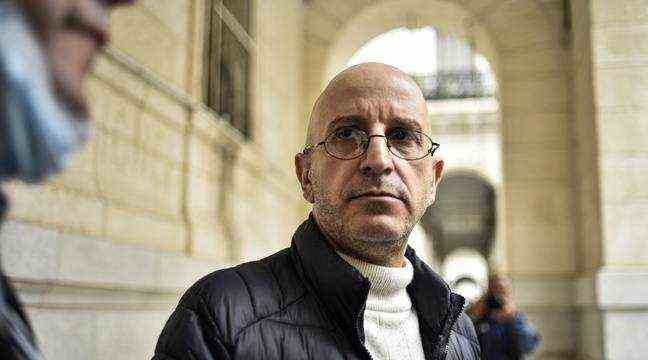A court in Algiers on Thursday sentenced to three years in prison a renowned Algerian Islamologist, Saïd Djabelkhir, prosecuted for – RYAD KRAMDI / AFP
A particularly heavy sentence. This Thursday, a court in Sidi M’hamed in Algiers sentenced renowned Islamologist Saïd Djabelkhir to three years in prison. The 53-year-old researcher, a specialist in Sufism, was prosecuted for “insulting the precepts of Islam”.
“There is no proof. The file is empty. We expected an acquittal ”, declared one of the lawyers, Me Moumen Chadi, who denounced a technical defect and said he was“ shocked ”by the severity of the sentence.
“The fight for freedom of conscience is non-negotiable”
Asked when leaving the court, Saïd Djabelkhir, also surprised by the heaviness of the verdict, said he would appeal and go to cassation if necessary. However, he was not placed under a warrant of committal.
“We have the misfortune of doing research in Algeria. But it is a fight that must continue for freedom of conscience, for freedom of opinion and for freedom of expression, ”he pleaded. “The fight for freedom of conscience is non-negotiable,” insisted Saïd Djabelkhir, a specialist in Sufism, a mystical and esoteric current of Islam. A graduate in Islamic sciences, he is the author of two well-known books dealing with religion.
Islamologist criticized the marriage of prepubescent girls
Prosecuted for “insulting the dogma and precepts of Islam” by a university colleague, a computer teacher in Sidi Bel-Abbès (north-west) supported by seven lawyers, he risked up to five years in prison. Said Djabelkhir is notably accused of having written that the sacrifice of sheep – a Muslim tradition – existed before the advent of Islam, and criticized certain practices such as the marriage of prepubescent girls in certain Muslim societies.
Algerian law punishes with three to five years of imprisonment and / or a fine “whoever offends the prophet or denigrates the dogma or the precepts of Islam, whether by writing, drawing, declaration or any other means ”. In a press release entitled “The drift of too much”, the Algerian League for the Defense of Human Rights (LADDH) denounced “the criminalization of ideas, debate and academic research yet guaranteed by the Constitution”.
Accused “by persons who have no competence in matters of religion”
During his trial on April 1, the Islamologist defended himself from having “undermined Islam”, the state religion in Algeria, assuring that he had only made part of “academic reflections” and that he was accused “by people who have no competence in matters of religion.” In a recent interview, he estimated that “a very great effort of new reflection on the founding texts of Islam is necessary because traditional readings no longer meet the expectations, needs and questions of modern man”.
“The Wahhabis (who claim to be part of a rigorous current of Islam), the Salafists want to impose on Muslims their reading of texts as being the absolute truth and this is what I never stop contesting through my writings”, Said Djabelkhir explained, who has already been at the heart of several controversies with clerics with a fundamentalist vision of Islam.
Support from many Algerian colleagues and politicians
His lawyers argued in court that the complaint against him was inadmissible because it came from individuals and not from the public prosecutor. The defense had also warned against “opening a breach” with this trial which would transform the courts into “a space for religious debates”. A warning shared by the LADDH which “refuses to allow court rooms to replace university amphitheatres, to allow courts to turn into inquisition courts”, according to its vice-president, Saïd Salhi.
Since the start of the affair, Saïd Djabelkhir has garnered the support of many Algerian colleagues and politicians. But his trial has divided. Its defenders consider that it is a debate of ideas and that the researcher must be able to give his opinion on questions relating to his specialty. On the contrary, his detractors accuse him of having denigrated verses from the Koran and the five pillars of Islam, such as the “hajj”, the pilgrimage to Mecca.

